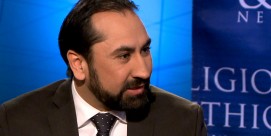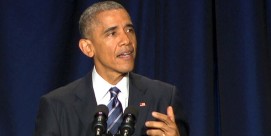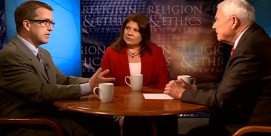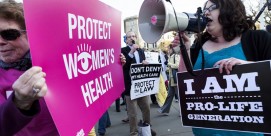BOB ABERNETHY, host: We want to talk more about some of the top stories of the week with Kevin Eckstrom, editor-in-chief of Religion News Service, and Kim Lawton, our managing editor. Kim, the State of the Union—what do you hear from religious folks about what they liked and what they didn’t like?
KIM LAWTON (@KimLawtonRandE), managing editor: Well, there wasn’t a lot of explicitly religious language in this year’s speech. The president did say that the U.S. is against, concerned about rising anti-Semitism. He did say we shouldn’t have stereotypes against Muslims as all of them being violent. But apart from that, he really talked about issues. But a lot of them were issues that people of faith care about. And so I heard from social justice religious people who were pleased by some of the economic policies, some religious conservatives, not so much. On the social issues, one issue that really stood out for me was the gay marriage question, and the president really characterized gay marriage as once an issue that divided us, but now it’s a matter of freedom and civil rights. Now for the people of faith who have been lobbying for that to happen, who see it as a matter of justice, they were pleased about it, but a lot of religious conservatives, especially evangelicals I heard from, didn’t like that language at all. You know, this is an issue that’s going to be in the coming weeks even more tense as the Supreme Court takes it up.
ABERNETHY: Yeah. Kevin, what did you hear?
KEVIN ECKSTROM (Religion News Service): Well, along the gay marriage front, the president characterized it as almost a done deal. He said that 70% of our country now lives in a state that has gay marriage, and he was almost saying this battle is over. And a lot of evangelicals like Kim was saying were saying “No, not so much." What I thought was really interesting was how he tried to recast the values debate. We’ve heard a lot in recent elections about values, and we had the Values Voters ten years ago. But what he was talking about was not, you know, the typical hot-button social issue values, abortion and gay marriage, but the underlying American values. Hard work and equal opportunity, and things like that, and trying to sort of reframe how we look at values in this country. Really interesting I thought at the very end, and this was deliberate, instead of saying “God bless America,” the president said “God bless this country that we love,” which I thought was subtle and significant, but also a very interesting change.
ABERNETHY: What was the difference?
ECKSTROM: I think, you know, a lot of times “God bless America” is sort of a throwaway phrase. A lot of people say that it’s uber-patriotic, that it doesn’t really mean anything because it’s everywhere all the time. This way was, it’s not “God bless America” as a country as opposed to other countries. It’s just, “God bless this land.” It was much more inclusive, I thought.
LAWTON: And, you know, I also heard by the way from religious groups that were, felt that perhaps the president should have spent more time talking about the challenge of ISIS and Al Qaeda, which he never even mentioned. A lot of religious communities saying, “You know, look. We’ve seen persecution of Christians, Yazidis, other religious minorities,” and the president didn’t spend that much time on it. So I heard some dissatisfaction with that, as well.
ABERNETHY: And what about the abortion thing? That came up.
LAWTON: Well, interesting politics as ever. A lot of religious conservatives, Catholics, and evangelicals, many Catholics, were in town for the March for Life, recognizing the Roe versus Wade anniversary. And many of them said, “Hey, we got out to the polls in November. We helped elect a GOP majority Congress. And look, right off the block in January, one issue we cared about, this abortion issue,” which by the way, never seems to go away—they were hoping for some legislation that got pulled. So at least for the time being, it shows that the Republican Party wants to reach out to these very faithful voters, but they also want to broaden their network with women and younger people, who haven’t been voting as much Republican, and they’re concerned that being seen as being focused on some of these issues will harm that. But you know, they have to balance those two constituencies.
ABENERTHY: And it was women in the House who –
LAWTON: Yes, yes. Republican women raising concerns about it.
ABERNETHY: Kevin, Marcus Borg died this week. 72 years old, I think. Very controversial in his career with the Jesus Seminar. You reported on him a lot.
ECKSTROM: Yeah, so the thing about Marcus Borg was he was one of a number of really respected scholars who questioned everything we’ve sort of taken for granted about Jesus and Christianity over the years. And instead of getting bogged down in the doctrines and theology surrounding Jesus, they looked at Jesus as a human. Now obviously that didn’t, that upset a lot of people, but what he was trying to do was say, “Let’s cut away all the debates we have around the historics—who said what, and where, and when, and how it happened—and let’s talk about the central message of Christianity.” And yes, he was one scholar, but he spoke for a lot of Christians who have questions about that.
ABERNETHY: Kevin Eckstrom, editor-in-chief of Religion News Service, and Kim Lawton, managing editor of this program. Thanks to you both.
ECKSTROM: Thanks.







